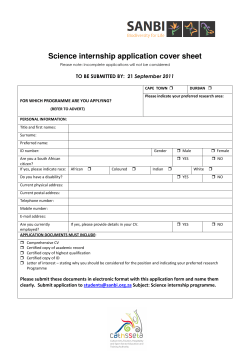
u v Mariet Vriens, AVNet K.U.Leuven (Belgium) EDULEARN10, 5&6 July 2010
u v Virtual placements: improving the international work experience of students Mariet Vriens, AVNet K.U.Leuven (Belgium) EDULEARN10, 5&6 July 2010 Virtual presentation EU-VIP • • • • What is EU-VIP? Why EU-VIP? Output Framework What is EU-VIP Enterprise-University Virtual Placements • Project funded by European Commission within the framework of lifelong learning programme • Duration: 01.10.2009 – 30.09.2011 • Consortium of 16 partners from 8 different countries Consortium • • • • • • • Katholieke Universiteit Leuven (BE) (project coordinator) University of Bologna (IT) Aalto University (FI) University of Turku (FI) West Pomeranian Business School (PL) FernUniversität in Hagen (DE) Laurea University of Applied Sciences (FI) • • • • • • • • • EAL, TietgenSkolen (DK) Katholieke Hogeschool Leuven (BE) University of Padova (IT) University of Groningen (NL) EADTU (NL) Coimbra Group (BE) EuroPACE ivzw (BE) EFMD (BE) BEST (FR) Goal To enhance international work placements through the use of new technologies Why EU-VIP Why international work placements? • Knowledge transfer between HEI and businesses • Internationalisation of curricula Why EU-VIP Obstacles for international work placements • Financial, social or geographical reasons that prevent international mobility • Integrating the work placement in the curriculum • Prepare students before going abroad • Follow-up and coaching during and after the placement EU-VIP Output • Design models for: – virtual mobility activities to prepare students, coach and follow-up students – fully virtual placements • Methodology: developing, testing and improving via 18 pilot projects • Project results will be collected in an online and printed guidebook Framework B Preparatory phase Setting up connections between HEI’s and international businesses o Student / enterprise / university driven Setting up application and selection procedures Integration of the internship in the curriculum Promotion of and information about international internships Before the internship Going through application and selection procedures (Supporting students in) administration and practical organization Registration of work placements Setting clear goals, expectations, tasks, deadline, communication and feedback protocol Preparative training sessions, preparing student guidebooks During the internship Coaching and feedback Student activities: o Organizational socialization o (Further) acquiring international skills o Reflection on personal development in relation to goals o Confronting acquired knowledge and skills with practice and further developing these skills After the internship Writing a report on the internship (reflection) Evaluation of student Evaluation of partnership business - university HE X X X X X X X X X X X X X X S X X X X X X X X X X X X More information ? • Visit our website: www.euvip.eu • Send us an email: Mariet.vriens@avnet.kuleuven.be
© Copyright 2025





















